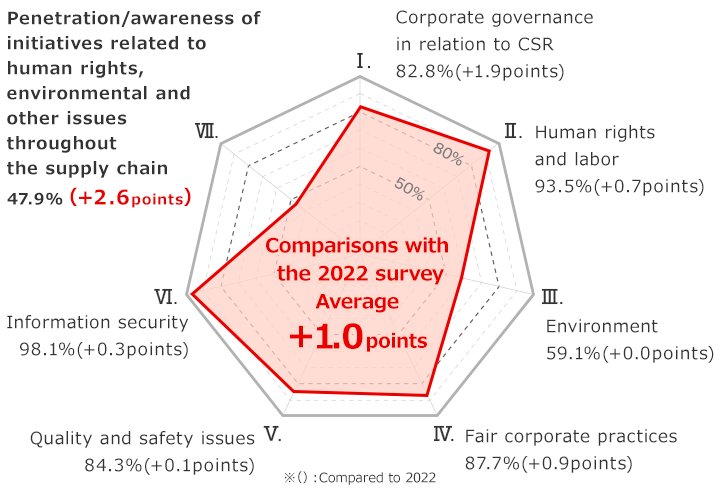Sustainable ProcurementQuestionnaire on Sustainable Procurement
Questionnaire Survey on Sustainable Procurement Questionnaire for
Fiscal Year 2024 (ending March 2025)
The JR East Group revised its procurement policies in September 2021 as an initiative to build a more sustainable society.
We have been conducting a yearly questionnaire survey (hereafter “survey”) with our business partners to address the topic of sustainable procurement.
The Purpose of This Survey
We regularly monitor our business associates’ activities through this survey regarding response to human rights, labor conditions, and other subjects, along with status of improvements. We also conduct on-site surveys (consisting of mutual communication regarding management and other issues, such as awareness and efforts to ameliorate human rights or environmental conditions on the part of chief suppliers, based on the results of survey responses).
We are promoting sustainability initiatives at all levels of supply chains through such communication with our business associates.
Results of FY2025.3 Survey and On-Site Survey
(Number of Companies)
| Item Name |
Fisical Year | ||
|---|---|---|---|
| 2025.3 | 2024.3 | 2023.3 | |
| The Survey | 1,254 | 1,187 | 1,386 |
| On-site Survey ※ |
33 | 37 | 30 |
※Please note: Results of communication regarding management issues are included from the 2022 survey, while communication regarding awareness and efforts to ameliorate human rights or environmental conditions on the part of chief suppliers has been conducted from the 2023 survey.
There were no incidents of compliance violation among the business associates with whom we conducted on-site surveys.
Survey Topics
The survey covered the seven themes below, with 57 questions in total.
Questions were primarily established for the purpose of monitoring our business associates’ frameworks for implementing initiatives related to those below.
The topics of the survey are in reference to those covered by international human rights and environmental organizations, referring to the United Nations International Bill of Human Rights (Universal Declaration of Human Rights), the Ten Principles of the UN Global Compact, Guiding Principles on Business and Human Rights, International Labour Organization Core Labour Standards, The Organisation for Economic Cooperation and Development, the Modern Slavery Act of 2015 in UK,the OECD’s Guidelines for Multinational Enterprises, and the California Transparency in Supply Chains Act of 2010.
The items also include specific initiatives related to JR East Group procurement policy and its requirements for potential business associates. The group is cooperating on these themes with our associates in business both domestically and internationally.
| Ⅰ.Corporate governance in relation to CSR | How CSR is promoted |
|---|---|
| Business Continuity Plan (BCP) | |
| Internal whistleblowing framework | |
| Dissemination of information regarding CSR | |
| Ⅱ.Human rights and labor | Basic stance on human rights |
| Basic stance on labor practices | |
| Prohibiting discrimination in employment (in terms of race, nationality, disability, etc.) | |
| Equal opportunity for employees (in terms of race, nationality, disability, etc.) | |
| Prohibiting inhumane treatment (abuse, corporal punishment, harassment, etc.) | |
| Appropriate wage payment (legal minimum wage in country or region of operations, etc.) | |
| Fair adjustment of working hours, holidays, paid holidays, etc. | |
| Prohibiting forced labor | |
| Prohibiting child labor | |
| Respect for religious and other traditions, customs, etc. of the countries and regions in which the JRE Group operates | |
| Safe and sanitary work environment with proper health management for employees | |
| Ⅲ.Environment | Basic principles and policies regarding environmental conservation |
| Management of chemical substances | |
| Establishment of environmental management system (with established targets for resources (i.e., raw materials, water, and others) and greenhouse gas emissions, as well as a system for initiatives in resource and energy conservation, recycling, and emissions reduction, among others) | |
| Environmental assessment and risk management (regarding product lifecycle management, including purchase of materials and parts, manufacturing process, logistics, product use, and disposal) | |
| Initiatives promoting biodiversity | |
| Employee education on environmental conservation | |
| Ⅳ.Fair corporate practices | Basic stance on fair corporate practices |
| Preventing exchange of inappropriate benefits among customers, business associates and other stakeholders | |
| Rejecting relations with anti-social forces and/or organizations | |
| Preventing unauthorized use of third-party intellectual property and illegal copying of copyrighted works | |
| Liaison for external inquiries and complaints | |
| Ⅴ.Quality and safety issues | Basic stance regarding quality and safety of products and services |
| Guarantee for quality and safety of products and services | |
| Ⅵ.Information security | Basic stance on information security |
| Ⅶ.Penetration/awareness of initiatives related to human rights, environmental and other issues throughout the supply chain | Basic stance on supply chain |
| Using raw materials not involved in conflicts, crimes, or human rights issues (initiatives in regard to conflict minerals) | |
| Environmental conservation (initiatives taken in consideration of the global environment) |
Survey Results

Results indicate that in five out of seven of the 2024 survey’s sections, more than 80% of our business associates have internal frameworks in place for promoting sustainability initiatives. In addition, overall average of sections combined increased by 0.6 point over the 2023 survey. An outstanding example is section Ⅶ, which, through initiatives such as “Communication regarding Management Issues”, showed an increase of 1.8 points in the penetration and awareness of human rights and environment-related initiatives.
Initiatives for the future
We will continue to conduct on-site surveys concerning communication regarding management issues and communication regarding penetration and awareness of initiatives related to human rights, environmental and other issues throughout the supply chain with our business associates.
In addition, we will share information when needed through discussion and briefing sessions.
(July 2025)
